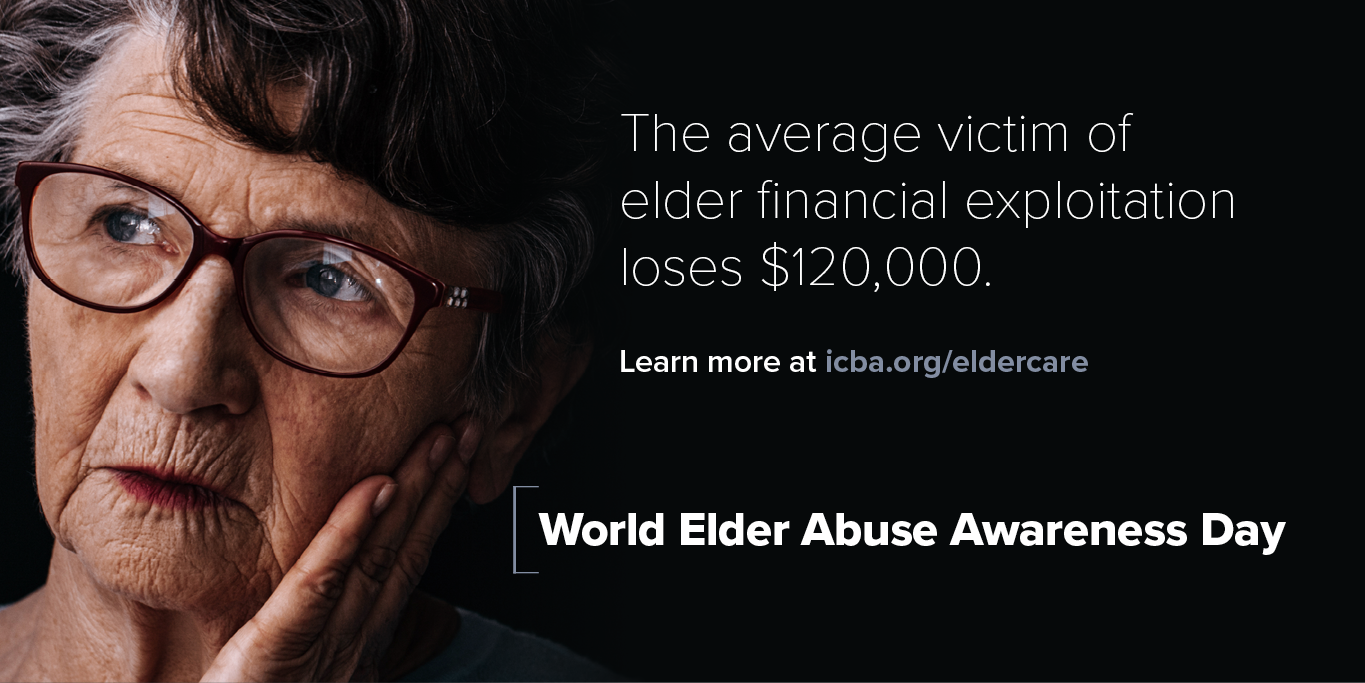Posted On: June 29, 2023 by First Community Bank and Trust in: Community Banking Community Banking Advocacy Community Events Community News General

Beecher, IL (June 29, 2023) - Roughly 20 percent of older Americans fall prey to financial exploitation totaling $3 billion annually or an average of $120,000 per elderly victim, according to a study from the AARP Public Policy Institute. And given that only one out of every 44 financial abuse cases are reported, according to the National Adult Protective Services Association, true losses from elder financial abuse could be north of $35 billion annually.
As relationship lenders and financial first responders, community banks are in a unique position to help shield our elderly customers against these prevalent threats through employee training and the use of technology to spot red flags and report suspicious activity to authorities.
Since World Elder Abuse Awareness Day happened on June 15, we wanted to provide our nation’s seniors and their family members with tips to guard against financial exploitation.
Medicare/Health Insurance Scams
It is difficult to imagine that someone could prey on those in need of medical assistance, but unfortunately, Medicare fraud is all too common. Criminals are posing as Medicare or medical supply representatives to obtain personal information or provide bogus services and use the information to bill Medicare or assume an identity to perpetrate fraud.
The outbreak of the COVID-19 pandemic has further spurred medical scams, with criminals purporting to be calling on behalf of a FEMA program that assists with funeral expenses. While this is a legitimate program, and you can reach out to FEMA to apply for these benefits, citizens should be mindful that:
• FEMA will not contact you until you call or apply for assistance.
• The government won’t ask you to pay anything to get this benefit.
As a good rule of thumb never share personal or financial information with anyone who contacts you out of the blue.
Zoom Phishing Emails and Internet Fraud
Con artists are also capitalizing on the rise in video meetings, registering thousands of fake Zoom-related internet domains to send phony emails, texts, or social media messages to trick consumers into clicking on bogus links to address “account suspension” or “meeting” notices. Those that took the bait inadvertently downloaded malware (malicious software) on their computer, exposing their personal information to potential use by fraudsters.
Internet scammers are also known for sending fake text messages alleging trouble with an internet account, credit card, bank account or shopping order. Many contain realistic looking logos to lure you into clicking on a link and divulging personal information.
To limit your exposure, avoid clicking on links from unsolicited emails or texts. If you suspect a problem with an account contact the bank or service provider directly.
Telemarketing/Phone Scams
Seniors schooled in etiquette may frown upon “hanging up the phone” or simply saying “no” to unsolicited calls, but it also leaves the door open to criminals posing as company representatives. Three notable examples include:
- The pigeon drop where con artists pretend to share found money in exchange for a “good faith” payment drawn from the contacted person’s bank account.
- The fake accident ploy where con artists create a false narrative that a loved one has been injured in an accident and needs money for medical expenses.
- Charity scams where con artists solicit funds on behalf of a charity for which they are not affiliated with or is not legit.
Remember, if it’s too good to be true, it probably is. If you want to give, go directly to the source. And if you are worried about a friend or family member, verify the information with them directly.
Unfortunately, scams are always changing, making fraud nearly impossible to fully eradicate, but we’ll never stop looking out for your benefit and encourage you to consult the Federal Trade Commission’s “scam alert” page for information about the latest scams targeting consumers at consumer.ftc.gov/scam-alerts.
Our First Community Bank and Trust employees are trained on the latest fraud prevention techniques and are available as a resource as well. They can help you spot potential scams and take appropriate measures to protect your account if you suspect you have been a victim of financial fraud.
About First Community Bank and Trust
First Community Bank and Trust is a privately-owned bank. Established in 1916 First Community Bank and Trust has been serving Beecher, IL, Peotone, IL and the surrounding communities for over 106 years. Our commitment to providing the best banking products and services is matched only by our outstanding customer service. We offer traditional community banking services, including mortgage, consumer, and commercial lending, as well as state of the art electronic banking services.
Press Contact:
Steve Koehn, Senior Vice President
First Community Bank and Trust
(708) 946-2246
About ICBA
The Independent Community Bankers of America® creates and promotes an environment where community banks flourish. ICBA is dedicated exclusively to representing the interests of the community banking industry and its membership through effective advocacy, best-in-class education, and high-quality products and services.
With nearly 50,000 locations nationwide, community banks constitute roughly 99 percent of all banks, employ nearly 700,000 Americans and are the only physical banking presence in one in three U.S. counties. Holding more than $5.8 trillion in assets, over $4.9 trillion in deposits, and more than $3.5 trillion in loans to consumers, small businesses and the agricultural community, community banks channel local deposits into the Main Streets and neighborhoods they serve, spurring job creation, fostering innovation and fueling their customers’ dreams in communities throughout America. For more information, visit ICBA’s website at www.icba.org.
# # #


0 comments